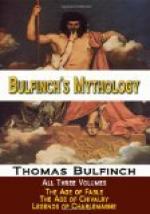That language was fashionable in England before the Conquest, and became, after that event, the only language used at the court of London. As the various conquests of the Normans, and the enthusiastic valor of that extraordinary people, had familiarized the minds of men with the most marvellous events, their poets eagerly seized the fabulous legends of Arthur and Charlemagne, translated them into the language of the day, and soon produced a variety of imitations. The adventures attributed to these monarchs, and to their distinguished warriors, together with those of many other traditionary or imaginary heroes, composed by degrees that formidable body of marvellous histories which, from the dialect in which the most ancient of them were written, were called “Romances.”
METRICAL ROMANCES
The earliest form in which romances appear is that of a rude kind of verse. In this form it is supposed they were sung or recited at the feasts of princes and knights in their baronial halls. The following specimen of the language and style of Robert de Beauvais, who flourished in 1257, is from Sir Walter Scott’s “Introduction to the Romance of Sir Tristrem”:
“Ne voil pas emmi dire,
Ici diverse la matyere,
Entre ceus qui solent cunter,
E de le cunte Tristran parler.”
“I will not say too
much about it,
So diverse is the matter,
Among those who are in the
habit of telling
And relating the story of
Tristran.”
This is a specimen of the language which was in use among the nobility of England, in the ages immediately after the Norman conquest. The following is a specimen of the English that existed at the same time, among the common people. Robert de Brunne, speaking of his Latin and French authorities, says:
“Als thai haf wryten
and sayd
Haf I alle in myn Inglis layd,
In symple speche as I couthe,
That is lightest in manne’s
mouthe.
Alle for the luf of symple
men,
That strange Inglis cannot
ken.”
The “strange Inglis” being the language of the previous specimen.
It was not till toward the end of the thirteenth century that the prose romances began to appear. These works generally began with disowning and discrediting the sources from which in reality they drew their sole information. As every romance was supposed to be a real history, the compilers of those in prose would have forfeited all credit if they had announced themselves as mere copyists of the minstrels. On the contrary, they usually state that, as the popular poems upon the matter in question contain many “lesings,” they had been induced to translate the real and true history of such or such a knight from the original Latin or Greek, or from the ancient British or Armorican authorities, which authorities existed only in their own assertion.




